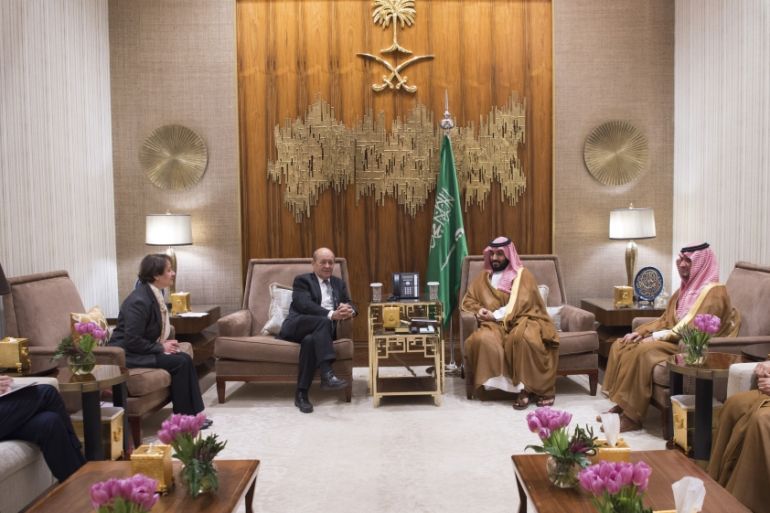Saudi Arabia ‘must go back to proper religious roots’
Veteran journalist Jamal Khashoggi says the Saudi crown prince should stop treating the Muslim Brotherhood as an enemy.

A veteran Saudi journalist and political commentator has said if Saudi Arabia wants to confront Iran, it must re-embrace its proper religious identity as a Wahhabi Islamic revivalist state and build alliances with organisations rooted in political Islam such as the Muslim Brotherhood.
Jamal Khashoggi wrote a regular column for Saudi-owned Al Hayat newspaper before he was banned in December last year for opinion pieces critical of Donald Trump when he won the 2016 US presidential election.
Keep reading
list of 4 itemsSaudi Arabia’s Riyadh selected to host World Expo in 2030
Qatar’s emir receives Saudi Arabia’s foreign minister on an official visit
Saudi Arabia’s e-sports looking to nurture its own hit games
Appearing on the Al Jazeera Arabic language TV channel’s Without Borders programme on Wednesday, Khashoggi said Saudi Arabia should build up its Sunni base in the Arab world and end its war against political Islam if it wants to win its fight with Iran.
“Crown Prince Mohammed bin Salman should get rid of his complex against the Muslim Brotherhood and stop treating them as the enemy or a threat to Saudi Arabia,” he said.
“This is a big mistake.”
Fatemeh Aman, a US-based Iran and South Asia expert, disagreed with Khashoggi’s implicit acknowledgement that the Saudi-Iranian rivalry is a struggle for the soul of Islam, Shia or Sunni.
“While it is true that Iran is a Shia-centric country, and often leverages religion in its geopolitical stances, its leadership does not have a unified view of Saudi Arabia,” she said.
“The Iranian leadership is not a black or white area of a Shia vs Sunni feud.”
The Israel factor
Khashoggi, who spoke to Al Jazeera from Washington, DC, expressed hope that Saudi Arabia would go back to assume its leadership of the Arab world and shift its focus to the causes that are very important to the Arabs, mainly to support the Palestinians in their struggle against Israel.
He deplored the authorities’ decision to allow some in the Saudi news media to express support for Israel against the Palestinians, while journalists and intellectuals known to support the Palestinian cause were put in jail or felt afraid to speak out.
https://twitter.com/saudibus222/status/933737282317713409?ref_src=twsrc^tfw
“It’s not in the Saudis’ interest to have relations with Israel. Israel will neither fight our battles nor attack Iran or Hezbollah for us.”
However, pointing to statements by Adel al-Jubeir, Saudi foreign minister, denying the existence of official communications tween Saudi Arabia and Israel, Khashoggi said: “We should build on that.”
Khashoggi expressed support for Crown Prince Mohammed bin Salman‘s efforts to reform the state and battle corruption within the Saudi state and royal family, but said the 33-year-old heir to the throne should engage Saudi citizens and intellectuals as part of his campaign.
He said if the campaign is to succeed, there needs to be “some kind of parliamentary body or consultative council to aid the state in its efforts”.
Saudi ‘calcification’
Khashoggi disagreed with Mohammed bin Salman’s claim that Saudi Arabia was dying a slow death for the past 10 years, coinciding mainly with the rule of the late King Abdullah (2010-2014), which left the kingdom’s coffers poorer by an estimated $400bn.
He said the Saudi state has long been suffering from “calcification” and deep corruption. “In the last 25 years, Saudi Arabia has lost over a trillion dollars to corruption,” he said.
Echoing Khashoggi’s views, Mahjoub Zweiri, a professor of Gulf studies at Qatar University, says Saudi Arabia’s economy, despite the much-touted reform effort, is still not in good shape.
|
|
“Saudi Arabia must first drain the sources of corruption within its power centres and royal family, and take concrete steps to engage the Saudi citizen in all of its efforts. Otherwise, the steps will not work,” he told Al Jazeera.
Khashoggi said the current Saudi leaders, including Mohammed bin Salman, have made several mistakes, notably in its handling of the situation in Lebanon, which culminated in the resignation of Prime Minister Saad Hariri.
The blockade against Qatar by Saudi Arabia and three other Arab countries, which started last June, was another case in point, he said.
“I don’t think the crisis in the Gulf Cooperation Council (GCC) is in Saudi Arabia’s interest,” he said. “I think it is a big mistake.”
Najd and Hejaz
Khashoggi, a native of the kingdom’s Hejaz region, told Al Jazeera he has had to face racist taunts from fellow Saudi nationals because of his forthright opinions. One journalist even wrote to say that Khashoggi is “too white to be a Saudi”, he said.
One reason for such taunting could be that many Saudis from the central Najd region, with Riyadh as its capital, do not consider the people of Hejaz as authentic Saudis.
Hejaz is the Red Sea coastal region of Saudi Arabia, stretching from the Gulf of Aqaba near the Jordan border all the way south to the border with Yemen.

The region includes the holy cities of Mecca and Medina, which historically have been a Muslim melting pot due to the annual Hajj pilgrimage.
The Najd, by contrast, is a desert region dominated by certain Bedouin tribal groups with darker skin tones than those of their Hejaz counterparts.
The Hejaz region was an independent entity – the Hashemite Kingdom of Hejaz – until 1925, when the sultan of Najd defeated the Hashemite rulers and annexed it with the help of colonial Britain.
Najd’s sultan, Abdulaziz Al Saud, also known as Ibn Saud, went on to found the kingdom of Saudi Arabia, merging Najd and Hejaz, and become its first monarch.
Follow Ali Younes on Twitter @ali-reports